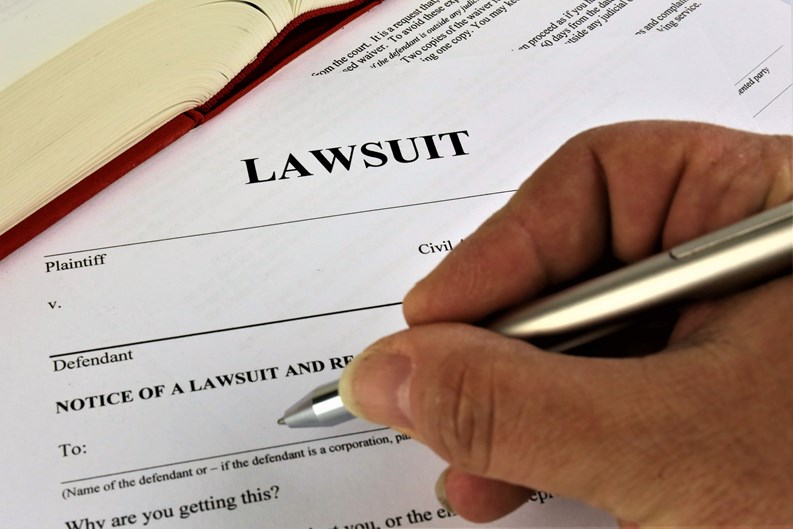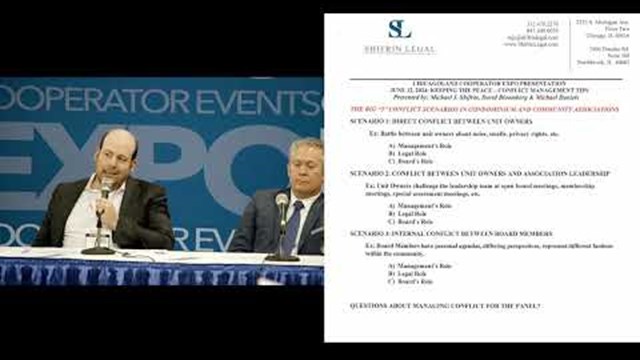There’s an old joke about business partners on the outs. The punchline is something like, “my lawyer is bigger than your lawyer!” Punchlines aside, though, who can you sue, when, and for what? In our litigious society, the short answer is nearly anybody, pretty much anytime, and for just about anything, depending on your resources. But in shared interest communities, that answer doesn’t really cut it. Whether it’s a resident suing their board, or a board going after a resident, litigation isn’t exactly a recipe for harmony and social cohesion. Knowing how to respond to a lawsuit—as well as how not to—is key to coming through the unpleasant process intact.
“When litigation involves owners, it can strain relationships,” says Kris Kasten, a partner with Chicago-based law firm Bartzen Rosenlund Kasten. “Neighbors may resent each other and become uncivil—or more uncivil—toward each other. This can lead to passive-aggressive or outright aggressive behavior, which may only serve to exacerbate the issues involved in the litigation.
“Furthermore,” he continues, “whether the litigation involves owners or third parties (like a contractor, for example), it can foment distrust of the board. Especially when the litigation is expensive for the association, because it’s not covered by insurance and can drag on for years.”
Attorney David Hartwell, with the law firm of Keough & Moody in Chicago, has seen the personal toll that lawsuits can have on a community. “There are a lot of emotions surrounding lawsuits,” he says, “especially when a resident names individual board members instead of just suing the association as a whole.” Associations and co-op corporations are not nameless, faceless entities like other businesses that might find themselves on the wrong side of a subpoena. When a resident sues the board, notes Hartwell, they are bringing a legal action against their neighbors—neighbors who have volunteered their time and energy to govern the community.
In most jurisdictions, even where owners/shareholders have statutory rights to access specific information and documentation about their community, litigation is one area where certain details and discussions must be kept confidential. As soon as even a suggestion of litigation arises, boards should proceed with extreme circumspection.
Hartwell is firm on the subject. “Board members should not discuss a lawsuit with other unit owners,” he states. “They shouldn’t attempt to try a lawsuit by public opinion within the community.”
Rules, Regulations, & Etiquette
Perhaps the first and most important question in a suit involving a co-op or condo board is: who should be privy to all the specifics of the situation, and who should not? That consideration is applicable to all types of litigation, whether it’s brought by owners, shareholders, outside vendors, or the board itself.
“Some owners may question the wisdom of litigation,” warns Kasten, “even when it’s necessary and appropriate for the association to pursue. Such distrust may arise when owners don’t understand the reason or purpose for the litigation. That lack of understanding may be because the board simply does not communicate well with owners—but it can also be because certain information cannot be disclosed for legal reasons.”
In Illinois, Kasten explains, an association subject to the Condominium Property Act or the Common Interest Community Association Act must disclose the status of any pending suits or judgments in which the association is a party. “That provision is broad and can cover significant and insignificant matters. For example, it can include collection actions against delinquent owners and foreclosure actions in which the association is also a defendant because of its assessment lien rights. Those types of litigation generally have a nominal impact on the association as part of ‘doing business.’ To address those types of litigation, the disclosure may include a general statement about ongoing collection actions but not about specific lawsuits.”
“Certainly, disclosing the existence of the action is permissible—and even necessary in, for example, the financial statements of the building where required,” says Mark Hakim, an attorney with Schwartz Sladkus Reich Greenberg Atlas, a law firm based in New York City. “Advising that a litigation exists and it is being handled by the insurance company would be acceptable and even appropriate, but I tend to advise boards that they should presume that no one is to be advised of the specifics, absent written instructions by our office, or the insurance company. The last thing any association or corporation would want is to inadvertently and in good faith prejudice the action and place the building, or even the board member, at risk.”
Insurance & Insurers in Legal Actions
Hakim cautions that “Insurance is the bane of every building’s existence, regardless of litigation these days. Given the amount of claims across the country, whether it’s from a natural disaster like a hurricane, or even something similar to what transpired at the Surfside condominium [in Florida, which collapsed in 2021 after decades of structural neglect, killing nearly 100 people], premiums are up. Insurance companies are dropping coverage, or altering it in such a way that buildings are out in the market trying to get comparable coverage. Litigations can certainly adversely affect coverage. Even notice of potential issues, without the actual commencement of a suit, may sadly have adverse effects on a building’s coverage.”
When responding to a lawsuit, the first thing that an association should do is put their insurance carrier on notice of the action. “Most Directors and Officers (D&O) policies require notification to the carrier within a certain period, or else a claim can—and will—be denied,” says Steven Mlenak, a partner with Greenbaum Rowe Smith & Davis, a law firm located in Roseland, New Jersey. Like all insurers, D&O insurers are extremely cognizant of claims and the costs associated with those claims. Repeated claims against a board’s D&O policy may result in higher premium costs. “The greater the number of claims and amount of money spent by a carrier to defend an association,” cautions Mlenak, “[the greater the] impact on the association’s ability to secure affordable coverage going forward.”
If a resident or group of residents moves to sue the board or the association, or is sued by the board or association, it’s important to note that any insurance covering the building or association for legal expenditures most likely does not cover them, says James A. Erwin, an attorney and founding partner of Erwin Law, LLC’ in Chicago. Unless you’re a sitting board member, “The association’s insurance policies do not cover your actions. They will not provide a defense for you or cover your legal fees should you be sued by the board.
“On the other hand, if you sue the board, depending on the facts of the case and the nature of the allegations made against the board, the association’s insurance policies may cover the board’s defense. If so, and if you prevail in the underlying cause of action, then there does exist the possibility that the association could be found liable to you for your legal fees, in which case the association’s insurer might also have to cover those fees. However, the factual circumstances which would give rise to such coverage is extremely narrow, and this possibility should not be relied upon when making a decision on whether or not to challenge the rules.
“In Illinois, regardless of whether you are a member of a condominium association or a common interest community association, the board has exclusive authority to promulgate rules and regulations. Those rules are binding and enforceable so long as they meet certain criteria including that the rules be clear, reasonable, not in conflict with the governing acts, the declaration or the bylaws, that they be adopted by proper board action with proper notice to the ownership and that they not be applied retroactively.
“Owners may make inquiry, protest and even challenge rules by court action if the board has failed to comply with the foregoing requirements. If you follow proper protocol, there should be no basis for the board to sue you simply for questioning rules promulgated by the board.”
Ellen Shapiro, partner at Allcock & Marcus, a law firm located in Braintree, Massachusetts, recommends that association boards try to resolve these matters pre-suit, regardless of who the potential litigation is coming from; resident, vendor, etc. “You never want to have a reputation of being litigious,” she says. “If the owners and the board of an association are constantly battling, the association”—and by extension, the community—“will develop a reputation.” And that will likely put off prospective buyers, as well as raising premiums, Shapiro adds.
Is Ongoing Litigation Public Knowledge?
Of obvious concern to both co-op and condominium owners is the possible effect ongoing litigation could have on their ability to sell their shares or units. Tight as the housing market may be, no buyer wants to walk into a hornets’ nest of litigation with possible financial consequences.
Shapiro notes that litigation of this type “is hard to hide, not hard to find. It might show up on Fannie Mae affidavits, or on searches. It depends on the purchase and sale agreement.”
“Generally,” says Hakim, “a purchaser’s attorney will submit a questionnaire to the property’s managing agent with a specific question as to whether there is or is not any litigation. The managing agent’s response will dictate the follow-up questions. More and more, I am seeing attorneys perform searches to see if there are lawsuits against the building, board, or seller. It is prudent to do so, as the information is important to the purchaser’s decision to pursue the unit.”
Mlenak adds that “Many mortgage lenders will request a statement from the association regarding both actual and threatened litigation. Also, most associations disclose this information in their annual audits, which sellers typically make available to prospective buyers.” So, in fact, litigation is often noted in the public realm.
The Smart Path
Unlike in many instances and situations, our sources in all markets indicate that there is no substantive difference in law between co-op and condo properties relative to lawsuits. It should be noted, though, that in some states (New Jersey, for example), state law requires a level of mandatory arbitration of disputes before suits are brought.
Regardless of the type of community in question, boards should try everything reasonable to avoid litigation for many reasons—costs, insurance, building morale, to name a few. While a building is a business, it’s also home to the people who own units within it.
To keep ahead of problems, Mlenak recommends that “associations should routinely consult with their counsel regarding their actions and keep up on current laws governing their association. Managers should encourage their board members to take voluntary training courses for board members through the Community Associations Institute (CAI) or other organizations and should have their counsel provide board member ethics seminars at least once per year for board members.”
In the final analysis, lawsuits aren’t good for anyone (except maybe the lawyers—another old joke). They are time-consuming, expensive, and can damage the reputation of a community. As board members, do your best to resolve disputes peaceably and in a timely manner. But, always do what’s best for the community. That’s a board’s first and foremost responsibility.
A J Sidransky is a staff writer/reporter for CooperatorNews Chicagoland, and a published novelist. He may be reached at alan@yrinc.com.










Leave a Comment